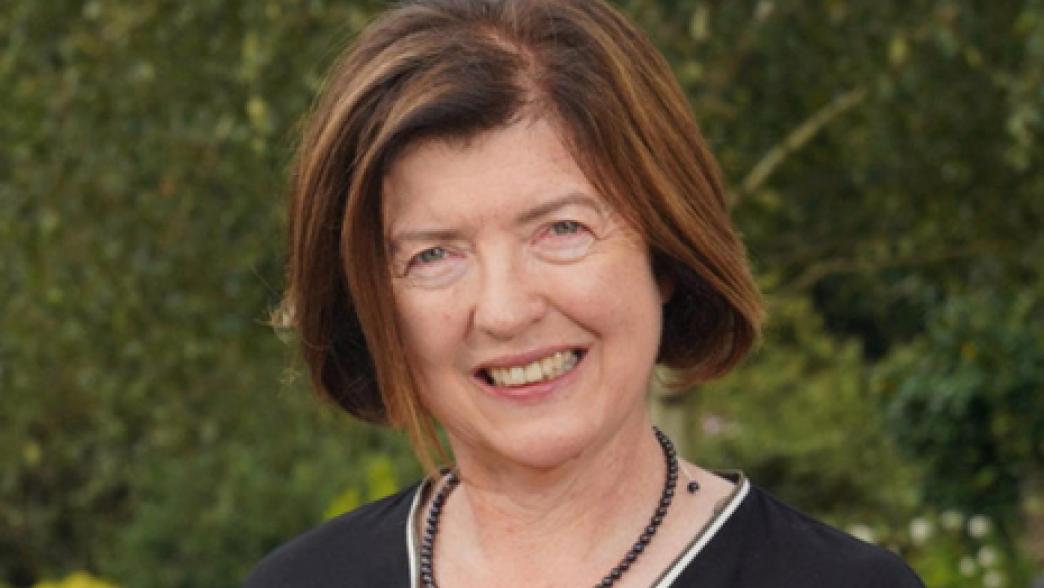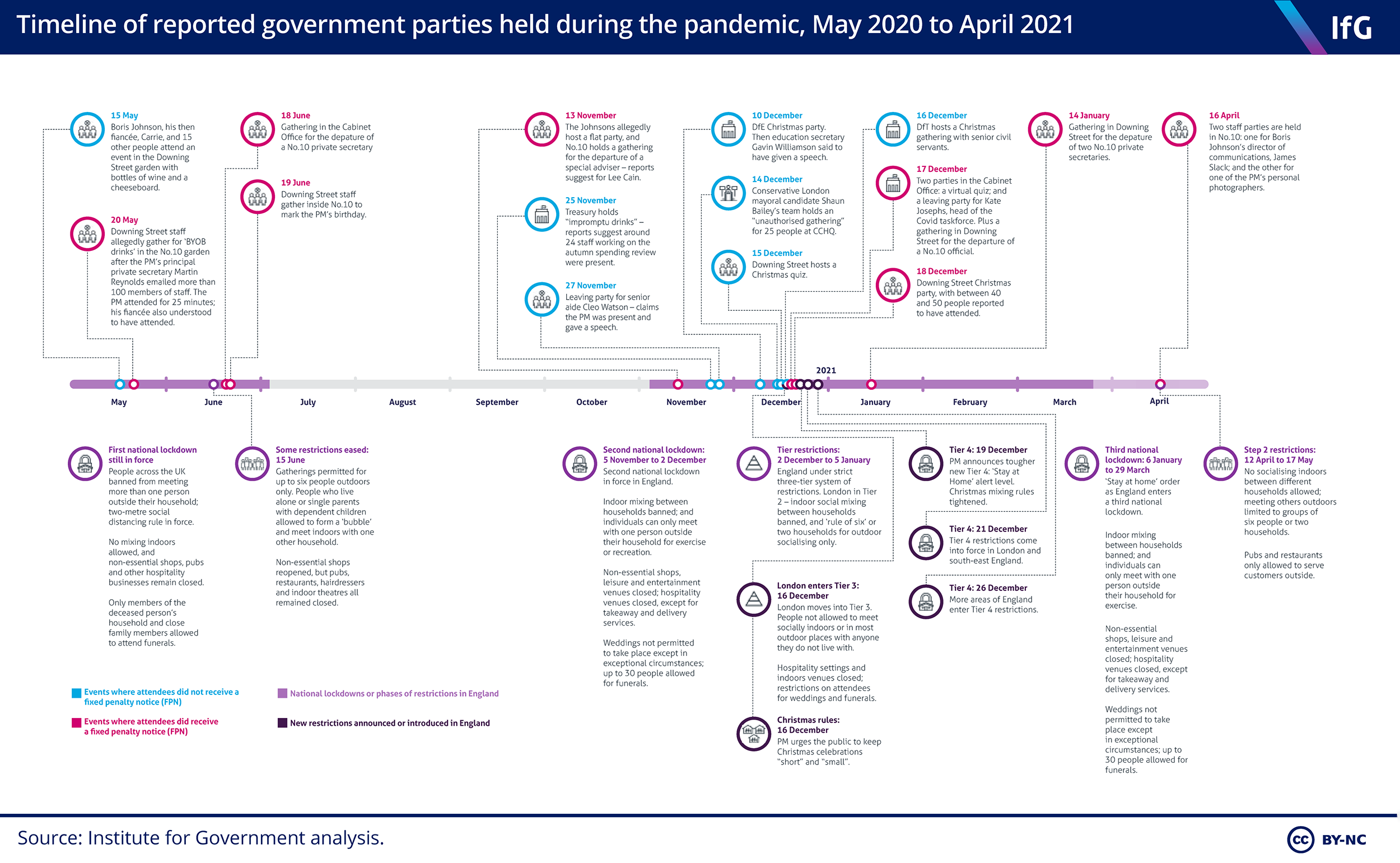Sue Gray investigation
Boris Johnson announced an investigation into allegations that Christmas parties in November and December 2020 broke the government’s own Covid rules.

What is the Sue Gray investigation?
On 8 December 2021, Boris Johnson announced an investigation into allegations that Christmas parties in November and December 2020 broke the government’s own Covid rules. The PM announced the investigation after a video emerged of former spokesperson Allegra Statton discussing the parties in a mock press conference.
The investigation was completed in January 2022 but, following the decision of the Metropolitan Police to investigate the breaches of Covid laws, Gray’s full report was put on hold and a short ‘update’ was published on 31 January 2022.
On 19 May 2022, the Met Police announced it had completed its inquiries and had issued 126 fixed penalty notices to 83 people. Of the 12 gatherings investigated, fines were issued for eight of them. Gray’s full report was published on 25 May.
What did the report say?
For each event – ranging from 15 May 2020 to 16 April 2021 – Gray set out the relevant Covid-19 regulations and government guidance at the time. The report seeks to establish the nature and purpose of each event, and whether or not it was appropriate in light of the regulations and guidance at the time.
The report makes the following conclusions:
The seven general findings set out in the update on 31 January 2022 “still stand”. These included:
- Some of the government’s behaviour is “difficult to justify” given the “backdrop of the pandemic”.
- Some of the gathering’s represent a “serious failure” to observe the high standards expected of the government.
- Many of the gatherings that took place, and some “attitudes and behaviours” of officials and advisers, were “not in line with Covid guidance at the time”.
- There were “failures of leadership and judgement in No 10 and the Cabinet Office”.
- Political and official leadership at the centre “must bear responsibility” for the culture under which junior civil servants believed their involvement at events was permitted, given the attendance of senior leaders in government.
- “Progress is being made” in creating clearer lines of leadership and accountability in No.10 and the Cabinet Office.
- Staff “felt unable to raise” concerns about behaviours they had witnessed or been subjected to at work. There were multiple examples of “unacceptable” treatment of security and cleaning staff. “Steps have since been taken” to make it easier for staff to raise concerns.
- Guidance covering the consumption of alcohol in the workplace has been issued to all government departments, as recommended in the update.
- “The matter of what disciplinary action should take place is outside of the scope of this report and is for others to consider.”
- Behaviour at these events does “not reflect the prevailing culture in Government and the Civil Service at the time”, during which individuals worked “tirelessly to deliver in unprecedented times”.
Why did a civil servant conduct the investigation?
It was initially overseen by cabinet secretary Simon Case but, after a story leaked that his own staff had held a gathering, and that Case might have been present, the inquiry was handed to another senior official, Sue Gray.
Gray is the second permanent secretary at the Department for Levelling Up, Housing and Communities. She previously worked in, and then ran, the propriety and ethics team in the Cabinet Office throughout the 2000s and 2010s. In 2018, she moved to Northern Ireland to head the Northern Ireland Department of Finance.
The investigation was an internal government investigation and did not have the status of judge-led or other public inquiries. The terms of reference were set by the prime minister. Such investigations are normally how the civil service establish the facts of an allegation of wrongdoing and make recommendations to the prime minister.
Many cabinet secretaries, with the support of the propriety and ethics team, have conducted similar investigations into cabinet ministers at the request of the prime minister. These include Gus O’Donnell’s examination of Liam Fox’s conduct while he was defence secretary and Jeremy Heywood’s investigation into Damian Green – which was conducted by Sue Gray, as head of propriety and ethics, to inform Heywood’s report – when he was first secretary of state under Theresa May. However, Sue Gray investigation was unprecedented in terms of its potential political impact and the way in which it touched on the role of the prime minister.
What did the investigation cover?
The original investigation was set up to look at events in Downing Street on 27 November and 18 December 2020, and at the Department for Education on 10 December 2020. The investigation then expanded as allegations of more gatherings have come to light.
According to the terms of reference, the report aimed to establish ‘a general understanding of the nature of the gatherings in scope'. Gray spoke to “key” individuals to find out whether events had taken place and, where they had, “their nature, purpose and how they came to be organised”. The report includes factual documentary evidence of the events, such as email invitations, photographs and communications between staff.
Did Sue Gray recommend that action be taken?
Yes. Although the terms of reference of the investigation stated that, “if required”, the report could “establish whether individual disciplinary action is warranted”, Gray did not make any such recommendations for individual disciplinary action towards officials and advisers, instead stating that this was “for others to consider”. It will now be up to their line managers and civil service leadership to decide on HR action against officials. In the case of special advisers, it is ultimately up to the prime minister to decide if they should stay in post.
What about the prime minister?
Gray’s report refers to the prime minister on multiple occasions, including his involvement in specific events. For example, Gray states that the prime minister “brought cheese and wine from his flat” to the event in the No 10 garden on 15 May 2020. After the publication of the report, the prime minister made a statement to the House of Commons in which he renewed his apology “to the House and to the whole country”. He said that he “took full responsibility for everything that took place on my watch” but that he had been “surprised and disappointed” by some of the revelations in the report, and “appalled by some of the behaviour, particularly in the treatment of the security and cleaning staff”.
What are the problems with this inquiry?
This investigation has highlighted a number of problems with how standards are enforced and investigations handled. Gray is a government official and as such, no matter how thorough her investigation, she has effectively been asked to investigate her own political boss. As a civil servant she is impartial, but not independent. Her terms of reference are set by the prime minister, and the team conducting the inquiry work in close proximity to those they are investigating.
In the past, other inquiries have become controversial after pressure was put on those writing the report to alter their conclusions: the prime minister’s previous adviser on ministerial interests, Alex Allan, resigned after the prime minister rejected his conclusion that Priti Patel had broken the ministerial code. Given the political importance this inquiry has attained, there is a risk that public confidence in the standards system is undermined further if the report is considered to obfuscate or if the government spins, or ignores, its conclusions. The situation is further complicated because the other person who could have conducted an inquiry into matters concerning the prime minister, Lord Geidt, is unable to start an inquiry unless the prime minister asks him. It is for these reasons that several bodies, including the Institute for Government, have called for reform so that an independent watchdog with statutory backing is able to launch its own inquiries independent of government.
- Keywords
- Partygate Ethical standards Civil servants
- Administration
- Johnson government
- Public figures
- Sue Gray
- Publisher
- Institute for Government
